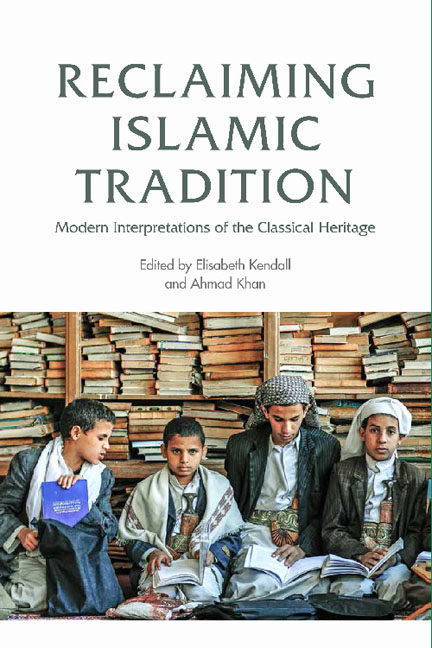Book contents
- Frontmatter
- Contents
- Acknowledgements
- About the Contributors
- Introduction
- 1 Modern Shiʿite Legal Theory and the Classical Tradition
- 2 Muḥammad Nāṣīr al-Dīn al-Albānī and Traditional Hadith Criticism
- 3 Islamic Tradition in an Age of Print: Editing, Printing and Publishing the Classical Heritage
- 4 Reaching into the Obscure Past: The Islamic Legal Heritage and Reform in the Modern Period
- 5 Reading Sūrat al-Anʿām with Muḥammad Rashīd Riḍā and Sayyid Quṣb
- 6 Contemporary Iranian Interpretations of the Qurʾan and Tradition on Women’s Testimony
- 7 Ibn Taymiyya Between Moderation and Radicalism
- 8 The Impact of a Sixteenth-Century Jihad Treatise on Colonial and Modern India
- 9 Jihadist Propaganda and its Exploitation of the Arab Poetic Tradition
- 10 Contemporary Salafi Literature on Paradise and Hell: The Case of ʿUmar Sulaymān al-Ashqar
- Index
4 - Reaching into the Obscure Past: The Islamic Legal Heritage and Reform in the Modern Period
Published online by Cambridge University Press: 11 November 2020
- Frontmatter
- Contents
- Acknowledgements
- About the Contributors
- Introduction
- 1 Modern Shiʿite Legal Theory and the Classical Tradition
- 2 Muḥammad Nāṣīr al-Dīn al-Albānī and Traditional Hadith Criticism
- 3 Islamic Tradition in an Age of Print: Editing, Printing and Publishing the Classical Heritage
- 4 Reaching into the Obscure Past: The Islamic Legal Heritage and Reform in the Modern Period
- 5 Reading Sūrat al-Anʿām with Muḥammad Rashīd Riḍā and Sayyid Quṣb
- 6 Contemporary Iranian Interpretations of the Qurʾan and Tradition on Women’s Testimony
- 7 Ibn Taymiyya Between Moderation and Radicalism
- 8 The Impact of a Sixteenth-Century Jihad Treatise on Colonial and Modern India
- 9 Jihadist Propaganda and its Exploitation of the Arab Poetic Tradition
- 10 Contemporary Salafi Literature on Paradise and Hell: The Case of ʿUmar Sulaymān al-Ashqar
- Index
Summary
In a scandalous story reported about the caliph al-Maʾmūn (r. 813–33 CE), the opinionated dynast does the unthinkable. He decides to declare permissible that most controversial of unions: ‘pleasure’ (mutʿa) marriage, by which a man and woman were joined in wedlock only temporarily for some preset period of time. As remembered in Sunni sources, scholars in the caliph's court act quickly to correct the edict. They vociferously remind him that the Qurʾan and the Prophet's Sunna had made clear that mutʿa (also known as temporary marriage) was strictly prohibited. Some eight centuries later in India, during a meeting of his famed interfaith salon, the Mughal Emperor Akbar the Great (r. 1556–1605 CE) discovered to his chagrin that he had far, far exceeded a Muslim man's Shariʿa limit of only four wives at any one time. Tasking his thought, the emperor recalled that his shaykh, the staunch Sunni revivalist ʿAbd al-Nabī al-Gangūhī (d. 1583–4), had once remarked that an early Muslim scholar in Kufa had held that a Muslim could marry up to nine women. In response to a hasty correspondence sent by Akbar, ʿAbd al-Nabī clarified to his former charge and current sovereign that he had only noted this unusual opinion as an example of early juristic disagreement. No scholar could now actually give a ruling to that effect. Fortunately, the emperor's courtiers proved more pliant. One noted that Imāmī Shiʿites (true) and the Mālikī school of law (untrue) allowed a limitless number of wives if they were by mutʿa marriages. Akbar immediately appointed a presumably ill-informed Mālikī judge to declare all his marriages legal, with the emperor's advisors explaining (somewhat correctly) that all other judges in the realm would have to respect this ruling.
In recent decades, some Muslim intellectuals have revived al-Maʾmūn's and Akbar's call. In countries like Egypt, the occasional advocate of temporary marriage has argued for its suitability as a solution to the dire challenges facing Muslim youth, who find the socio-economic demands of normal marriage unmanageable.
- Type
- Chapter
- Information
- Reclaiming Islamic TraditionModern Interpretations of the Classical Heritage, pp. 100 - 135Publisher: Edinburgh University PressPrint publication year: 2018



